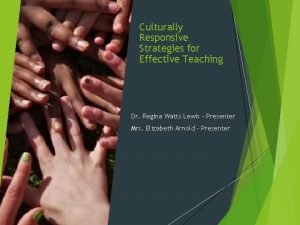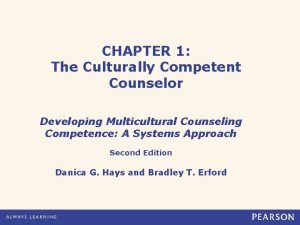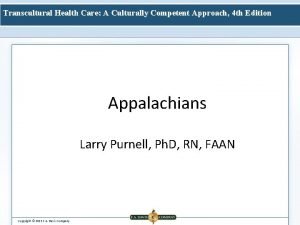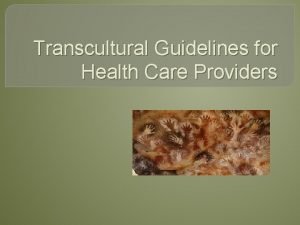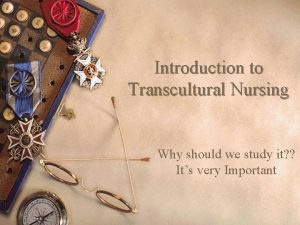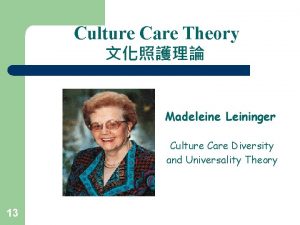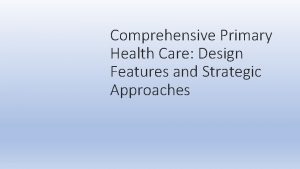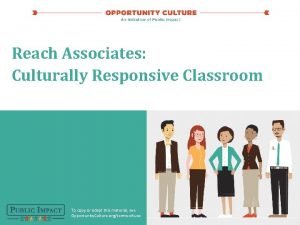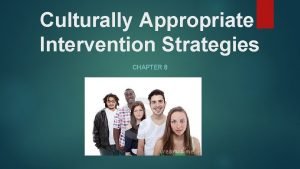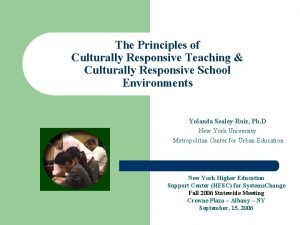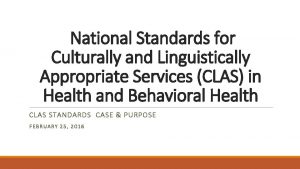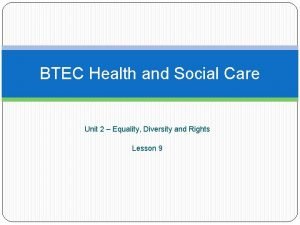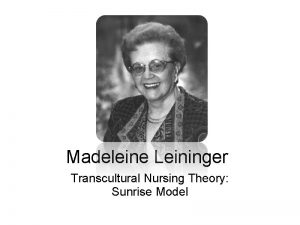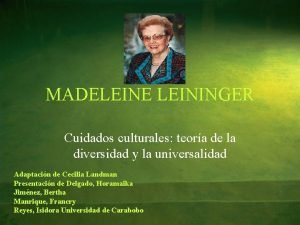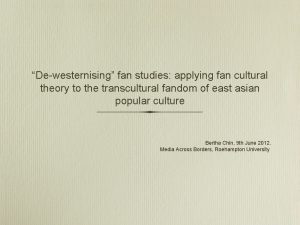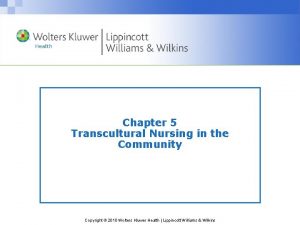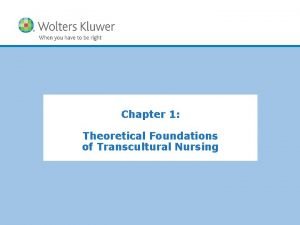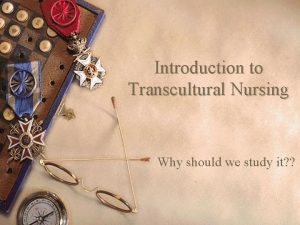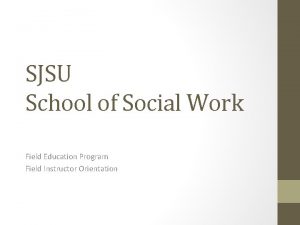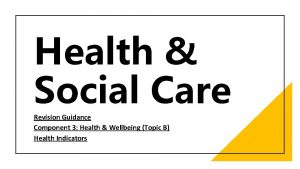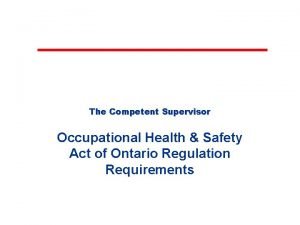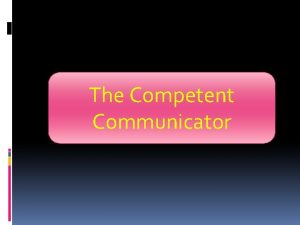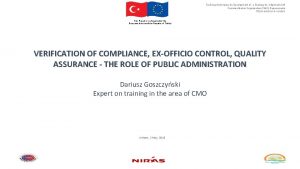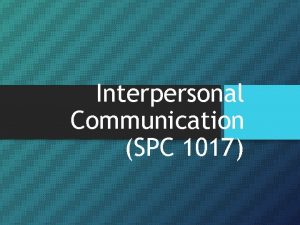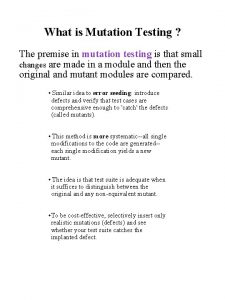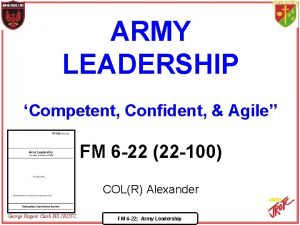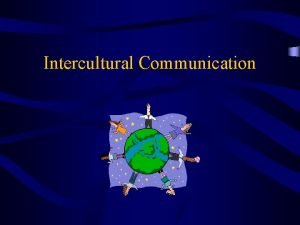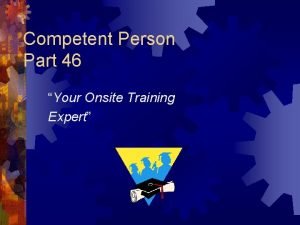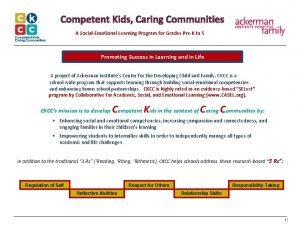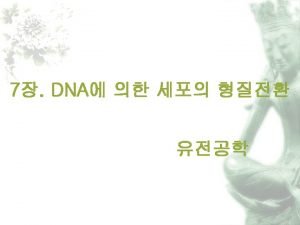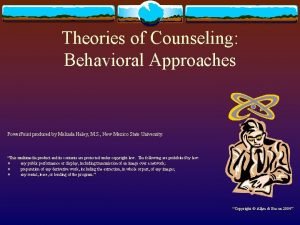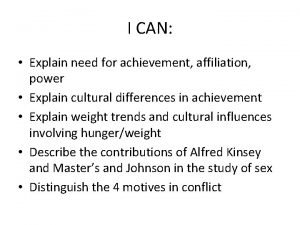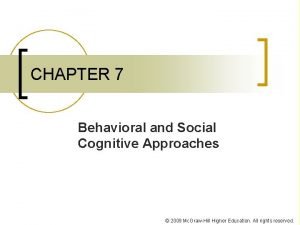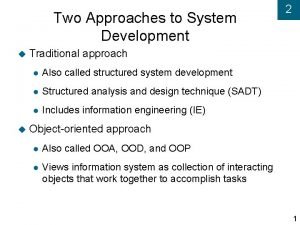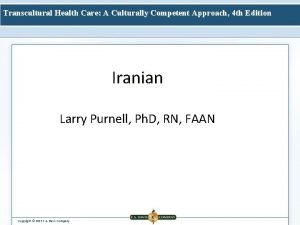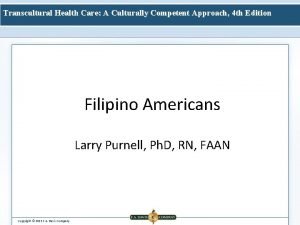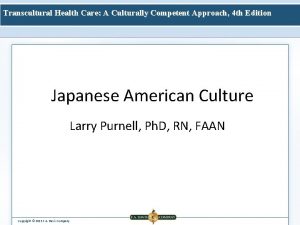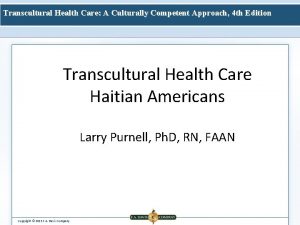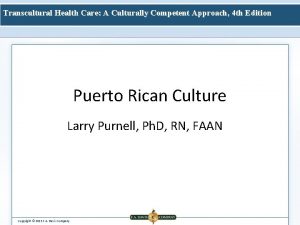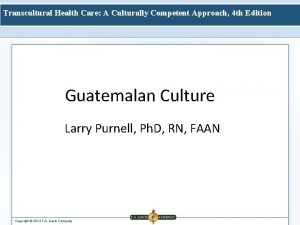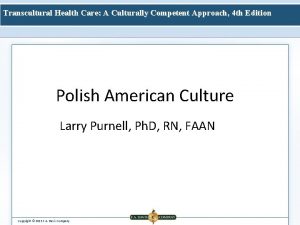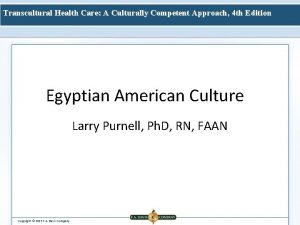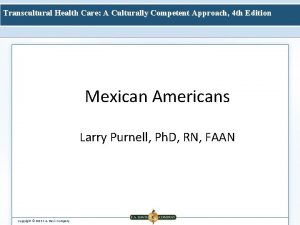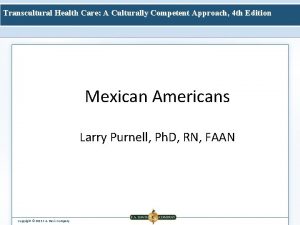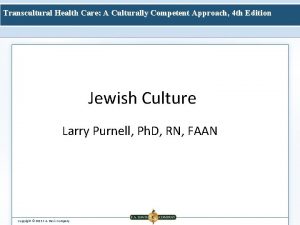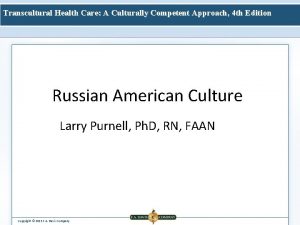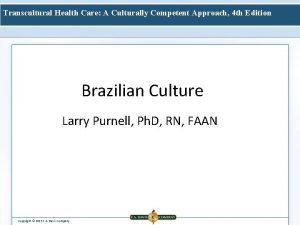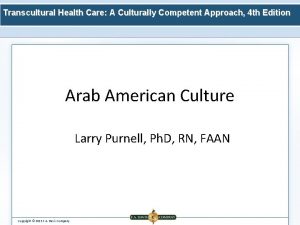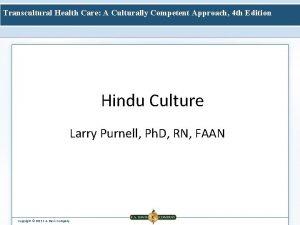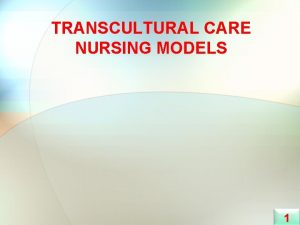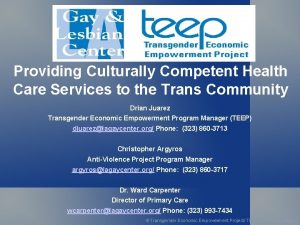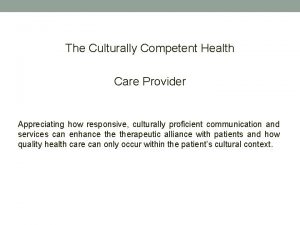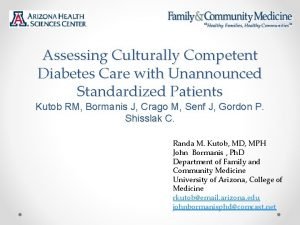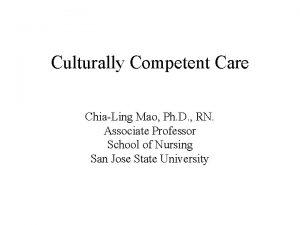Transcultural Health Care A Culturally Competent Approach 4


























































- Slides: 58

Transcultural Health Care: A Culturally Competent Approach, 4 th Edition Thai Culture Larry Purnell, Ph. D, RN, FAAN Copyright © 2013 F. A. Davis Company

Transcultural Health Care: A Culturally Competent Approach, 4 th Edition Overview/Heritage § Siam, the land of the musical The King and I, is the former name of Thailand. § Thailand is the only Southeast Asian country that has never been colonized by westerners. § In 1939, the name of the country was changed from Siam to Thailand, which literally means “the land of the free. ”

Transcultural Health Care: A Culturally Competent Approach, 4 th Edition Overview/Heritage § The first people who are culturally considered “Thais” probably migrated from the south of China. § Over 150, 000 Thais live in the United States. § The first two Thai immigrants in the United States were Eng and Chang, the famous Siamese twins who captured the world’s attention because of their conjoined chests.

Transcultural Health Care: A Culturally Competent Approach, 4 th Edition Communication § Many Thais with graduate degrees work in the United States in professional fields such as medicine, nursing, and engineering. § Others own Thai restaurants or grocery stores and provide work for other Thais at their businesses. Copyright © 2013 F. A. Davis Company

Transcultural Health Care: A Culturally Competent Approach, 4 th Edition Communication § The standard Thai dialect, derived from Pali and Sanskrit (ancient South Asian languages, ) is the official language in Thailand. § The Thai language is a fixed tonal language and has five tones. § The written alphabet is a complicated system of 44 letters with over 33 vowels or vowel combinations. Copyright © 2013 F. A. Davis Company

Transcultural Health Care: A Culturally Competent Approach, 4 th Edition Communication § Although English is taught in Thai schools, the English proficiency of Thai people in general is not very high. § A younger person is expected to show respect for an older person through his or her gestures and language. Copyright © 2013 F. A. Davis Company

Transcultural Health Care: A Culturally Competent Approach, 4 th Edition Communication § A Thai female uses the word, “Kah, ” while a Thai male uses “Kraab” at the end of a sentence to add politeness in a conversation. § Looking in a person’s eyes and conversing quietly reflect respect and politeness. § A distance of 11/2 to 2 feet between two speakers is preferable. Copyright © 2013 F. A. Davis Company

Transcultural Health Care: A Culturally Competent Approach, 4 th Edition Communication § Kisses and hugs between a male and female are not traditional in the Thai culture. § Thais usually greet each other with the ‘Wai’ motion —putting the palms of both hands together in a prayer-like gesture and bowing the head slightly. § This gesture is used by both men and women of all age groups. Copyright © 2013 F. A. Davis Company

Transcultural Health Care: A Culturally Competent Approach, 4 th Edition Communication § Most Thais have long first and last names. A Thai is usually referred to by his or her first name, even in an official setting like school or work. § Their names usually have clear meanings. § A first name is often given by a Buddhist monk or a fortune-teller based on the date, day of the week, and time of a newborn’s birth. Copyright © 2013 F. A. Davis Company

Transcultural Health Care: A Culturally Competent Approach, 4 th Edition Communication § When married, a woman usually uses her husband’s last name. A couple’s children also use their father’s last name. § When Thai names are written in English, the spelling is merely a kind of phonetic translation from its real spelling in the Thai alphabet. § Almost all Thais have a short nickname used by their family and close friends. Copyright © 2013 F. A. Davis Company

Transcultural Health Care: A Culturally Competent Approach, 4 th Edition Family Roles & Organization § A man is the head of the household in a traditional Thai family. § In most Thai families, responsibilities involving house chores and taking care of children belong to a woman. § However, more Thai families today have begun to divide house chores between men and women.

Transcultural Health Care: A Culturally Competent Approach, 4 th Edition Family Roles & Organization § Thai children are taught to respect elders. § Talking back to elders is discouraged. § Thai female adolescents have traditionally been expected to protect their virginity until marriage. Dating with a chaperone present is preferable to parents. § Children are the center of the family for Thais.

Transcultural Health Care: A Culturally Competent Approach, 4 th Edition Family Roles & Organization § Traditional Thai families are nuclear in nature. Today, however, single families are becoming more common in Thailand. § It is not uncommon for a single Thai to live with his or her sibling(s), cousin(s), aunt(s), uncle(s), grandparent(s), and/or parent(s).

Transcultural Health Care: A Culturally Competent Approach, 4 th Edition Family Roles & Organization § Many Thai children sleep with their parents from birth until some point in time before they reach adolescence. § Thai parents do not feel comfortable leaving their infants in a separate bedroom. § Often children are spoon-fed by adults until they are 6 to 7 years old.

Transcultural Health Care: A Culturally Competent Approach, 4 th Edition Family Roles & Organization § Education is so vitally important for Thais that westerners are often amazed when a Thai spouse will leave his or her partner or children behind for years to further studies aboard. § Marriages in Thailand used to be mainly arranged by the parents. § Today, young Thais have more freedom to select a spouse.

Transcultural Health Care: A Culturally Competent Approach, 4 th Edition Communication § Respect for older people, an important aspect of Thai culture, is always signaled by a younger person gesturing with the ‘Wai’ to the older person first. § When the elders in a Thai family become too old to take care of themselves, younger members are morally required to care for them. Copyright © 2013 F. A. Davis Company

Transcultural Health Care: A Culturally Competent Approach, 4 th Edition Family Roles & Organization § Approximately 20 years ago, commercial lounges and bars were the main or only places for gays and lesbians for social gatherings. § Gays and lesbians in Thailand are more accepted today than in the past. § At present, same sex marriages are not supported by Thai laws.

Transcultural Health Care: A Culturally Competent Approach, 4 th Edition Workforce Issues § Most Thais usually try to avoid personal conflicts at work and are hard workers. § Although the family is deemed very important for Thais, in many circumstances, especially for economic reasons, work comes before family. § Thai Americans tend to socialize among themselves rather than be exposed to Americans or peoples from other cultures.

Transcultural Health Care: A Culturally Competent Approach, 4 th Edition Workforce Issues § Thai Americans respect their supervisors because seniority is strongly valued in their culture. § Thus, they might not be assertive at work. § Communication in the workplace with Thai Americans who are learning English as their second language should be clear. Slang expressions should be avoided.

Transcultural Health Care: A Culturally Competent Approach, 4 th Edition Biocultural Ecology § An estimated 75 percent of the population in Thailand is pure “Thai. ” § Chinese represent 14 percent of the population § 11 percent of the population is made up of Malay, Lao, Mon, Cambodian, Vietnamese, Asian Indian, Caucasian, or hill-dweller tribes (Karen, Lisu, Ahka, Lahu, Mien, & Hmong. )

Transcultural Health Care: A Culturally Competent Approach, 4 th Edition Biocultural Ecology § Regardless of mixed heritages, skin color, and facial profile, the Thais’ size and body structure are usually much smaller than those of Caucasians. § Lower doses of indinavir/ritonavir is preferable than using larger doses as used among Caucasians due to the smaller body size of the Thais.

Transcultural Health Care: A Culturally Competent Approach, 4 th Edition Biocultural Ecology § Common genetic conditions among Thais include Gucose-6 -phosphate dehydrogenase deficiency, and Thalassemia.

Transcultural Health Care: A Culturally Competent Approach, 4 th Edition High-Risk Behaviors § Recent surveys of Thais health conditions showed that unsafe sex (12. 7%) is the leading high-risk behavior, followed by § Smoking, Alcohol consumption, illicit drug use, nonuse of helmet while driving motorcycle/motorbike, hypertension, high body mass index, high cholesterol, inadequate vegetable and fruit consumption, physical inactivity.

Transcultural Health Care: A Culturally Competent Approach, 4 th Edition High-Risk Behaviors § Thailand has been commended for its response to HIV/ AIDS. § However, Thailand has in large measure ignored the problems of HIV/AIDS among men who have sex with men. § The problem is interrelated with Thailand’s commercially successful male sex industry. Young male sex workers sell their services—negotiating with sex, condoms, work, and social stigma while living with the ever-present danger of an HIV infection.

Transcultural Health Care: A Culturally Competent Approach, 4 th Edition High-Risk Behaviors § Smoking and alcohol consumption follow unsafe sex as the second and third most common risk factors found in the behavior of Thai people. § The amount of alcohol consumed by Thais is found to be higher than that consumed by the French, Americans, Japanese, and Filipinos.

Transcultural Health Care: A Culturally Competent Approach, 4 th Edition Nutrition § “We should eat to live, not live to eat” is not only a famous saying in Latin, but also in Thai, reflecting the central importance and meaning of food in the Thai culture. § A Thai balanced diet usually includes low-fat/lowmeat dishes with a large percentage of vegetable and legumes. § Rice and fish are main staples.

Transcultural Health Care: A Culturally Competent Approach, 4 th Edition Nutrition § Vegetables and meats are usually fried or grilled and prepared in many combined variations to supplement rice. § Overall, pork or chicken is eaten more than beef. Fish, and other forms of seafood, are also regularly enjoyed. § Communal eating is an essential part of the Thai culture.

Transcultural Health Care: A Culturally Competent Approach, 4 th Edition Nutrition § Noodle recipes are much loved by Thais and prepared with the noodles already mixed in with meats and vegetables. § For all foods, seasonings are critical to the Thai artistry of accommodating different palettes. § Fish and oyster sauces are very often combined with soy sauce as a basic starting point for many recipes.

Transcultural Health Care: A Culturally Competent Approach, 4 th Edition Nutrition § Many Thais love very spicy food, but not all. Tom. Yum is a traditional spicy Thai soup that is gaining popularity worldwide. It has been found to have positive effects on people’s health because of its ingredients, which include lemon grass, galangal roots, kaffir lime leaves, hot chilies, red onions, and garlic

Transcultural Health Care: A Culturally Competent Approach, 4 th Edition Nutrition § Som-Tum is a famous spicy Thai salad originating from the northeast of Thailand. § Most Thais living in the United States consume enough fruits and vegetables; not enough bread and milk; and too much meat, fats, oils, and sweets. § Hot or warm foods or drinks are considered healthier than cold ones.

Transcultural Health Care: A Culturally Competent Approach, 4 th Edition Nutrition § Many types of herbs are considered to promote health and work against cancer development. § Some herbs are considered as an overall panacea.

Transcultural Health Care: A Culturally Competent Approach, 4 th Edition Clicker. Check The leading high-risk behavior among Thais is a. Alcohol consumption. b. Unprotected sex. c. High fat diet. d. Lack of physical activity.

Transcultural Health Care: A Culturally Competent Approach, 4 th Edition Correct Answer Correct answer: B Research reports that the leading high-risk behavior among Thais is unprotected sex.

Transcultural Health Care: A Culturally Competent Approach, 4 th Edition Pregnancy and Childbearing Practices § Thai women view pregnancy as a special time in their lives when they need extra care physically and emotionally. § Ideally, the age of 20 is the optimal time for pregnancy due to the women’s physical and emotional maturity. § Thai women want their husbands and their mothers to be supportive of their pregnancies.

Transcultural Health Care: A Culturally Competent Approach, 4 th Edition Pregnancy and Childbearing Practices § Due to modesty, especially during a vaginal examination, Thai women prefer female healthcare providers over their male counterparts. § They do not feel comfortable exposing their bodies to male providers. § The pregnant woman’s most significant person who directs their practices during this time in her mother.

Transcultural Health Care: A Culturally Competent Approach, 4 th Edition Pregnancy and Childbearing Practices § Pregnant women are advised not to complain or get upset so that newborns will be. § They should not to sit on stairs or door sills to avoid a difficult labor and delivery. § When a pregnant mother blocks other people from going up and down stairs or in and out of a doorway, the unborn baby could be blocked inside the mother’s uterus.

Transcultural Health Care: A Culturally Competent Approach, 4 th Edition Pregnancy and Childbearing Practices § In general, Thai pregnant women are discouraged from visiting a hospitalized person (regardless of the kind of sickness), attending a funeral ceremony, or visiting a house where there has been a death. § Some women believe that eating eggs may result in having smelly newborns.

Transcultural Health Care: A Culturally Competent Approach, 4 th Edition Pregnancy and Childbearing Practices § Drinking coconut juice can cause too much vernix caseosa. § Others drink a lot of the juice, believing that it will help their newborns to have smooth and beautiful skin texture. § Consuming chocolate or drinking coffee will cause a newborns to have a darker skin texture. § Most Thais view lighter skin as more favorable.

Transcultural Health Care: A Culturally Competent Approach, 4 th Edition Pregnancy and Childbearing Practices § A safety pin on their outfit over their belly works against a kind of ghost who always wants to steal the unborn baby from a mother’s womb. § After a child is born, the mother is left cold and wet. Therefore, the mother should gain some heat to dry out her body, especially her uterus. § Warm/hot drinks and foods are consumed; ice chips or ice cubes are avoided.

Transcultural Health Care: A Culturally Competent Approach, 4 th Edition Pregnancy and Childbearing Practices § Some avoid chicken postpartum because a chicken likes to scratch the ground to look for food. The chicken meat, therefore, could scratch open the perineum. § Eggs are avoided by some mothers, believing that they could cause a big scar on the perineum.

Transcultural Health Care: A Culturally Competent Approach, 4 th Edition Pregnancy and Childbearing Practices § Some postpartum Thai women drink Ya Dong, a Thai nonalcoholic or alcoholic drink infused with herbs. § The drink helps with blood production and drying out the uterus quickly.

Transcultural Health Care: A Culturally Competent Approach, 4 th Edition Death Rituals § Because most Thais are Buddhists, only the funeral rites in connection with Buddhism are addressed here. § Like other Buddhists, Thai Buddhists believe that after a person dies, the person will be reborn somewhere else based on that person’s Karma. § Karma means ‘action’ and refers to the process by which a person’s moral behavior or actions have consequences for the person’s future, either in the present or later life.

Transcultural Health Care: A Culturally Competent Approach, 4 th Edition Death Rituals § Thai Buddhists follow the custom of cremation. § In the funeral ceremony, oftentimes Buddhist monks are invited to chant verses to the dead and the family. § Food and candles are offered to the monks. § The sons of the deceased are expected to be ordained for a short period of time, ranging from a week to three months. § The ordination is believed to help the dead go to heaven.

Transcultural Health Care: A Culturally Competent Approach, 4 th Edition Death Rituals § Female relatives normally wail quietly. § The family members pray quietly to the dead before the cremation to ask forgiveness and wish the dead to be reborn in a happy and peaceful home.

Transcultural Health Care: A Culturally Competent Approach, 4 th Edition Spirituality § The vast majority of Thais are Buddhist, while the rest are Muslim, Christian, and Hindu or other. § In the United States, over three million people are Buddhist. § Although not in agreement with all other religious beliefs, Thai Buddhists are free to incorporate any other religious values and/or animism to their beliefs and practices when deemed good.

Transcultural Health Care: A Culturally Competent Approach, 4 th Edition Spirituality § Most Thais in all socioeconomic strata to some degree incorporate animism, fortune telling, and astrology. § Many families in Thailand have a spirit house where they believe that the ancient spirits of the land (Pra Poom) dwell. § For most Thais, family support along with Buddhism is a crucial source of strength.

Transcultural Health Care: A Culturally Competent Approach, 4 th Edition Spirituality § When coping with difficulties or illnesses, many Thai lay people and health-care professional follow Buddha’s teaching. § They believe that the illness can be improved by following the Five Precepts so that their present or next life.

Transcultural Health Care: A Culturally Competent Approach, 4 th Edition Spirituality § The Five Precepts are comparable to half of the Christian Ten Commandments and stress abstinence from killing, stealing, lying, sexual misconduct, and illicit drugs and alcohol consumption.

Transcultural Health Care: A Culturally Competent Approach, 4 th Edition Spirituality § Four Noble Truths reflect tenets about life. § The First Noble Truth maintains that life is suffering, and that suffering as such is found in four unavoidable life moments; namely birth, illness, aging, and death. § The Second Noble Truth maintains that the cause of all suffering is Tanha, or personal desire. § The Third Noble Truth is a belief that overcoming Tanha is attainable. § The Fourth Noble Truth outlines paths to end suffering.

Transcultural Health Care: A Culturally Competent Approach, 4 th Edition Spirituality § Meditation and prayer are ways for many Thais to cope with an illness. § Meditation is a means for Thai older people to enhance their self-awareness, peace of mind, sleep, and physical health. § Spiritual concepts of Karma, Nirvana, the Five Precepts, the Middle Way, and the Four Noble Truths are all important for Buddhist Thais.

Transcultural Health Care: A Culturally Competent Approach, 4 th Edition Health-care Practices § Health promotion and disease prevention behavior among the Thais is very limited. § Bad Karma and/or negative supernatural power causes mental illness. § Therefore, folk therapies from traditional healers are the first resource for many Thai families. § When such therapies do not seem to work, they go to contemporary medical facilities as their second resource.

Transcultural Health Care: A Culturally Competent Approach, 4 th Edition Health-care Practices § Folk therapies may include healing ceremonies, using shamans (as a mediator) to converse with supernatural beings (such as black magic, evil beings, and/or ancient/natural spirits), negotiating with them that the sick person might be released from their illness. § In such ceremonies, holy water or oil is usually used to anoint the sick.

Transcultural Health Care: A Culturally Competent Approach, 4 th Edition Health-care Practices § Some Buddhist Thais may not seek health care until their symptoms become severe. § Stigmatization attached to mental illness and beliefs in animism and Karma tend to prevent some Thais from seeking professional help when mental health problems arise. § Many Thais may appear stoic in trying to withhold expressions of pain or suffering from their illness.

Transcultural Health Care: A Culturally Competent Approach, 4 th Edition Health-care Practices § No religious beliefs against blood transfusion exist for Thais. § However, donating and receiving organs is another matter. Although acceptable among many Thais, belief in their rebirth might prevent some from donating their organs, believing that they might not have the organ when needed in the next life.

Transcultural Health Care: A Culturally Competent Approach, 4 th Edition Health-care Practitioners § Thais in the United States and elsewhere tend to consult their family and friends first when they feel ill or have medical problems. § Thai women usually seek female practitioners for childbearing care and gynecologic problems due to their modesty and their culture. § However, if female practitioners are not available, they are generally willing to accept male practitioners.

Transcultural Health Care: A Culturally Competent Approach, 4 th Edition Health-care Practitioners § Respect for seniority is a strong cultural value among Thais. Thus, less experienced health professionals in Thailand are expected to respect those with more experience in the same profession. § Thai physicians receive the most respect, followed by the head nurses and junior nurses.

Transcultural Health Care: A Culturally Competent Approach, 4 th Edition Clicker. Check A common belief among Thais is that mental illness is caused by a. Eating too much pork. b. Eating too much chicken. c. Bad blood. d. Bad karma.

Transcultural Health Care: A Culturally Competent Approach, 4 th Edition Correct Answer Correct answer: D Many Thais believe that mental illness is caused by bad karma.
 Culturally responsive vs culturally relevant
Culturally responsive vs culturally relevant Culturally competent counselor
Culturally competent counselor Transcultural health care definition
Transcultural health care definition Transcultural health care definition
Transcultural health care definition Culturally congruent care definition
Culturally congruent care definition Theory of culture care diversity and universality
Theory of culture care diversity and universality Multifaceted approach to health care
Multifaceted approach to health care Comprehensive primary health care approach
Comprehensive primary health care approach Health care levels primary secondary tertiary
Health care levels primary secondary tertiary Cultural deprivation definition
Cultural deprivation definition Vdoe culturally responsive teaching
Vdoe culturally responsive teaching Culturally responsive teaching and the brain book study
Culturally responsive teaching and the brain book study Culturally responsive teaching in music education
Culturally responsive teaching in music education Classroom
Classroom Culturally responsive teaching self assessment
Culturally responsive teaching self assessment Culturally appropriate intervention strategies
Culturally appropriate intervention strategies Working with culturally and linguistically diverse families
Working with culturally and linguistically diverse families Pedagogy meaning
Pedagogy meaning National culturally and linguistically appropriate services
National culturally and linguistically appropriate services Care value base health and social care
Care value base health and social care Madeleine leininger theory metaparadigm
Madeleine leininger theory metaparadigm Teoria de leininger
Teoria de leininger Fan culture theory
Fan culture theory Transcultural nursing questions
Transcultural nursing questions Theoretical foundation of nursing chapter 1
Theoretical foundation of nursing chapter 1 Definition of transcultural nursing
Definition of transcultural nursing Sjsu msw program
Sjsu msw program Health and social component 3
Health and social component 3 Vacant word formation
Vacant word formation Competent supervision meaning
Competent supervision meaning Competent person's reporting
Competent person's reporting What is cimah regulation
What is cimah regulation Elements of intercultural competence
Elements of intercultural competence What makes a competent communicator
What makes a competent communicator Competent authority
Competent authority Spc 1017
Spc 1017 Competent authority
Competent authority Morphology synonym
Morphology synonym What is mutation
What is mutation Rama at sita
Rama at sita Fall protection competent person training ppt
Fall protection competent person training ppt Army leadership styles 6-22
Army leadership styles 6-22 The highly capable individual
The highly capable individual Competent intercultural communicators resist ambiguity.
Competent intercultural communicators resist ambiguity. Havisten competent
Havisten competent Define competent person
Define competent person Competent kids caring communities
Competent kids caring communities Competent jerks lovable fools
Competent jerks lovable fools Competent person definition
Competent person definition Competent cell이란
Competent cell이란 Datagram networks
Datagram networks Cognitive approach vs behavioral approach
Cognitive approach vs behavioral approach Michael treacy and fred wiersema
Michael treacy and fred wiersema Avoidance
Avoidance Cognitive approach vs behavioral approach
Cognitive approach vs behavioral approach Approach research meaning
Approach research meaning Diagram for traditional approach
Diagram for traditional approach Deep learning approach and surface learning approach
Deep learning approach and surface learning approach Primary care a collaborative approach
Primary care a collaborative approach
